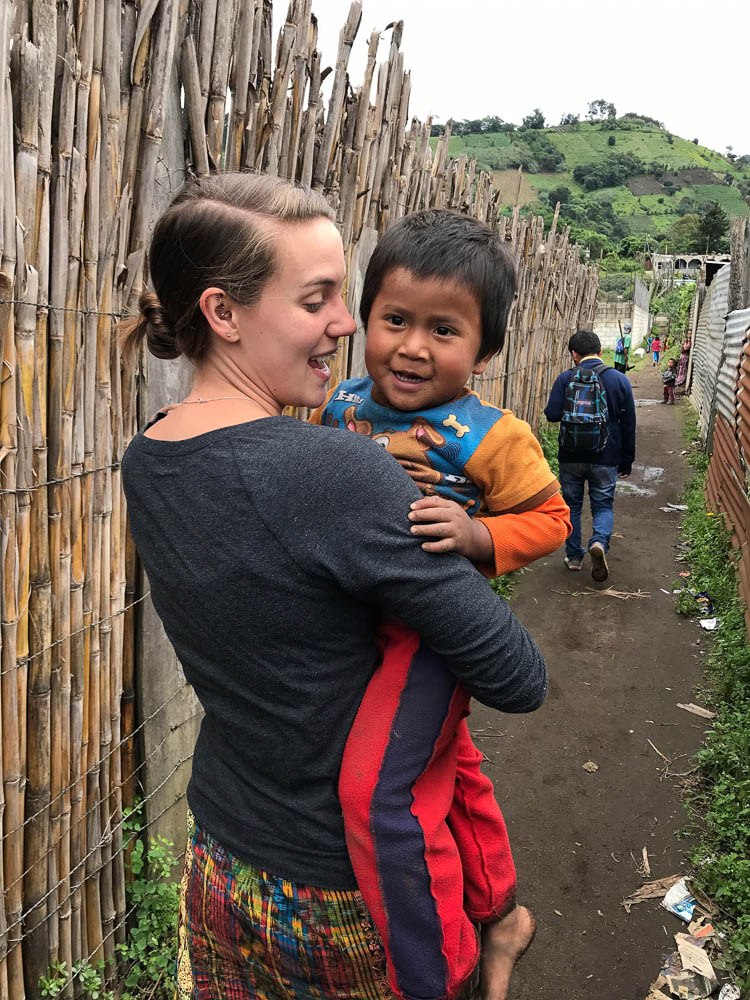Spending summer in a poor Central American village is nothing new to Emily Keller.
The daughter of altruistic physicians who ran seasonal clinics in Guatemala, Keller developed a connection to the underserved population of Santa Maria de Jesus, a rural town on the slope of a volcano in the southern part of the country.
Four years ago Keller, who grew up in Burlington, Vermont, decided to move to Santa Maria de Jesus. In 2014, with her parents retired and back in Vermont, she and a friend started Cosechando Felicidad Inc., which translates into “Harvesting Happiness,” a nonprofit that started out as a feeding program for the elderly.
“We serve three meals a day, every single day of the year,” Keller says. “Last year alone we served more than 27,000 meals.”
Over the last three years her organization has expanded to offer assistance programs, including medical aid, groceries, baby formula, and scholarships. It now has two employees and more than 60 volunteers.
And while all this was happening, Keller enrolled in the UConn School of Dental Medicine.
Santa Maria de Jesus doesn’t have a dentist, and Keller intends to solve that problem in a few years.
“Yes, I’d love to go practice there,” she says.
Last summer Keller went back to Santa Marie de Jesus for both her nonprofit and her schooling. The second-year dental student spent eight weeks carrying out an oral health research project under the UConn School of Medicine’s Global Health Program, directed by Dr. Kevin Dieckhaus, chief of the UConn Health Division of Infectious Diseases.
“When Dr. Dieckhaus spoke at the beginning of the year about having a summer research opportunity, I wanted to see if there was any way that I could start incorporating dentistry into what I’m really passionate about, serving the people of Guatemala,” Keller says.
She started collecting data to assess the village’s need for oral health by administering a survey created by the World Health Organization for the developing world. She sat down and interviewed more than 150 people individually. Keller’s fluency in Spanish and her familiarity within the community enabled her to take that personal approach.
“The literacy rate is extremely low, so it wouldn’t have been feasible for me to distribute these and have them fill them out on their own,” Keller says.
In February, she and the other students who did summer research projects will present their findings to classmates and faculty. By then Keller will have analysis of how her village compares to other parts of the world.
And she also may be able to use her research to benefit the population she studied.
One way would be to add Santa Maria de Jesus to the list of potential places where UConn dental students and faculty might travel for future service trips to provide care.
Another way would be to help the community help itself.
“I’m hoping to bring the research back and meet with the heads of the town, and try to talk to them about some public health measures that can be taken, like fluoridation of water, and use this as evidence that shows they can really improve things with some pretty minor changes,” Keller says.
This is the first year dental students participated in the Global Health Program, and Keller already has spoken to other dental students about her experience.
“I’m really thankful to UConn for giving me this opportunity,” Keller says. “The fact that they not only would allow me to do this, but support me, I think is really huge and not something that you would find everywhere.”



